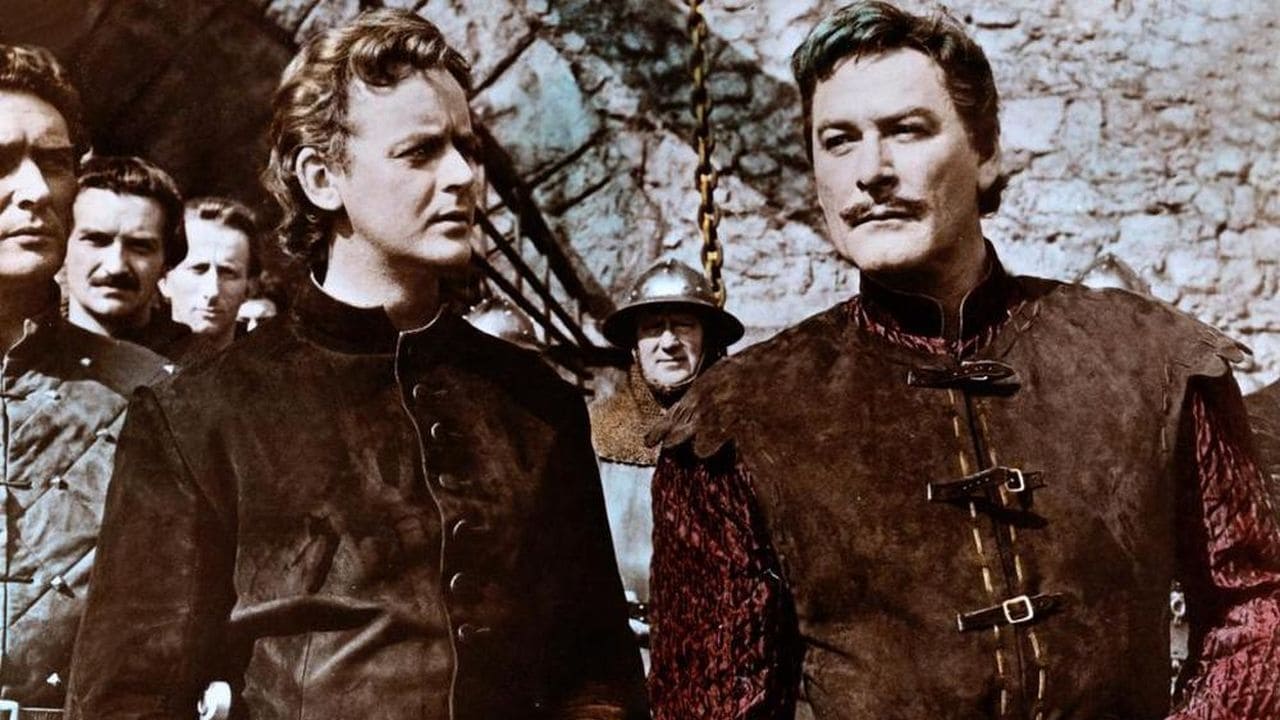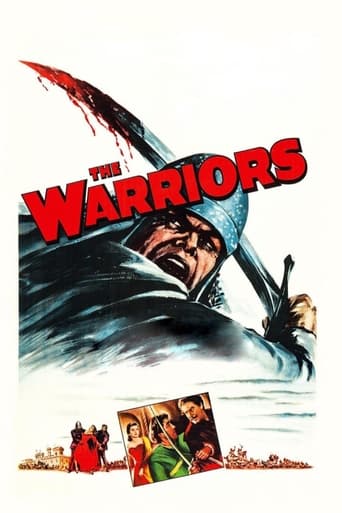

It isn't all that great, actually. Really cheesy and very predicable of how certain scenes are gonna turn play out. However, I guess that's the charm of it all, because I would consider this one of my guilty pleasures.
... View MoreI really wanted to like this movie. I feel terribly cynical trashing it, and that's why I'm giving it a middling 5. Actually, I'm giving it a 5 because there were some superb performances.
... View MoreOne of the worst ways to make a cult movie is to set out to make a cult movie.
... View MoreGreat example of an old-fashioned, pure-at-heart escapist event movie that doesn't pretend to be anything that it's not and has boat loads of fun being its own ludicrous self.
... View MoreBut I think it's one of Flynn's best older films.Plot is good, solid medieval action. Edward Prince has won a battle over the French, now he stays in France to rule it. French Knights don't want English lords lording over them. So they first try to assassinate him, then kidnap his lady, Joan of Kent. Edward tries to rescue her, fails, has a sword fight, joins the enemy to learn their plans, tries to rescue her again, etc, until the final big battle where the good guys have to win if it's going to make sense.I do want to say that Errol is 46 in this film. That is not too old an age to fight as a knight. In the medieval times, the aged warrior was the most qualified to lead younger knights. He had the experience that was vital, for there was no professional Arny as we know it in those day. A man with experience in battle was more important than youthful energy. Nobles in those days would go into battle, on horseback in the front line, well past their 70th year. So Errol running around in armor at his age is not an error. In fact, The real Black Prince Edward was still fighting wars at Errol's age, albeit he died of illness when he was 7 days short of his 46 birthday. And Errol was a heavy drinker so maybe thats why he doesn't look the part. But I thought it was OK.The love story has stuff added in such as the kidnapping, but the love between Errol and Joanna is not contrived, as history tells us Prince Edward and Joan of Kent loved each other very much. Prince Edward had a crush on her since boyhood as they grew up together. but when he grew up he decided after he to marry her off to a lordly friend of his. But after he told Joan his intention, she professed her deep love for Edward, perhaps in a similar scene as the movie shows it. Edward decided Joan was better off as his wife, not his friend. They were first cousins so that was frowned upon, but the Pope gave his permission so they were married in England and THEN went to France to rule.In the movie Joanna Dru is too young compared to Errols age. The real Joan of Kent was two years the elder of Edward. So she should be 48 years old in the movie.Peter Finch is a great French Knight, not a demon rebel. You can feel sorry for him, how he hates seeing France under the thumb of Edward. But in the end, you don't shed a tear at his death. But you say, there were brave men on both sides and this movie jolly well shows that bravely.Watch it for a good time.
... View MoreThe American director Henry Levin once described THE DARK AVENGER as a "western in armour", which is an apt description of this colourful saga. The casting is hilarious: Errol Flynn, born in 1909, plays the son of Michael Hordern, born 1911. Although Sir Michael aged quickly, Flynn is no spring chicken either, and looks all of his 46 years. The result of living in the fast lane is right up there on the screen. Christopher Lee shines in one of his early roles and demonstrates keen swordmanship in his duel with Errol Flynn. Actually Lee duels with British Olympic sabre champion Raymond Paul - with Flynn taking over in the close-ups. The supporting cast is full of future TV household names. Rupert Davies and Ewen Solon had considerable success years later in "Maigret". Richard O'Sullivan, a talented child actor, went on to play swashbuckler "Dick Turpin" in the 70's. Fans of Patrick McGoohan had better not miss the beginning of this movie, the star of the cult TV classic "The Prisoner" only has a few lines in a brief appearance. This movie always crops up on Sam Kydd's filmography but spotting him is virtually impossible, maybe Sam was edited out of the finished film. THE DARK AVENGER was filmed on the abandoned IVANHOE lot and is enjoyable comic strip history, it's a good way to spend a rainy Sunday afternoon.
... View MoreOnce you survive the numbing and typical pageantry which marks the beginning of the picture, the intrigue gets rather interesting. The lousy dub on this commercially purchased VHS tape is another obstacle. Alas, no DVD is available (though there are some crumby DVD dubs out there, too!). However, once I adjusted the contrast, brightness and beefed up the color level (a lot), it was a viewable tale the got very slowly more interesting as time went slowly on. This picture marks Finch's rise and Flynn's decline (no more to swash and buckle after this). Compare his "Captain Blood" twenty years previous and you can see what time and booze did to poor Errol.Joanne Dru certainly DID look bored throughout, as was mentioned earlier. Perhaps the whole thing was just a costume romp for her.It's such a shame when a decent copy of the film is apparently unavailable from which to make copies. I find the same problem with the 1940 version of "Our Town."
... View MoreYears ago I read a book on the Hundred Years War by an English historian named Desmond Siward. The author's premise was that there is indeed an English and a French interpretation of the conflict. The English see it as a great period of glory and conquest in their history. The French look on it as a century of agony for their people. Professor Siward came down pretty hard on his fellow countrymen and said the French version is far closer to the mark.Case in point is Edward, Prince of Wales, eldest son of Edward III of England and military genius bar none. He was in fact the architect and inspiration of their military victories at Crecy and Poitiers. Edward was also a pretty bloodthirsty guy who led a massacre at Limoges and also negotiated an alliance with the Castilian Ruler Pedro the Cruel. I'll let his name speak for itself.The movie here has the English as liberators as Edward comes to the continent to enforce his father's claim on Aquitaine. In fact that had been part of the English crown through their descent from Eleanor of Aquitaine. In point of fact the Black Prince was there trying to enforce Dad's claim on the throne of France itself through his mother who was a daughter of the French king Philip IV the Fair. That was what the whole Hundred Years War was about, the English trying to conquer France, pure and simple.An aged Errol Flynn who's dissipation is plainly showing is the Black Prince. He looks older than Michael Hordern who appears briefly as Edward III. I think Flynn may very well have been older than his "dad."Joanne Dru plays Joan of Kent, widow of Sir John Holland and beloved of the Black Prince. The love story is one of the great medieval legends of Merrie Old England and maybe they should have made a film on just that. But Ms. Dru looks bored throughout. She was soooo much better in Red River, She Wore A Yellow Ribbon, and All the King's Men.Peter Finch plays the "villain" Count Robert DeVille, deputy of the Constable of France, DuGuesclin who waged a successful guerrilla war against the English although it wasn't called that then. Finch is a villain because he and other nobles won't accept a peace treaty with England that their King John has signed in captivity. How rude of them. Finch is the best one in this film and he could easily have been written as the hero.This was the last of Errol Flynn's swashbucklers and he was clearly getting too old for believable swordplay.
... View More